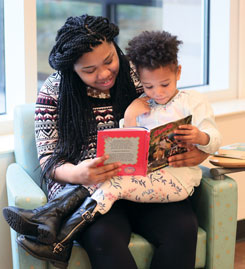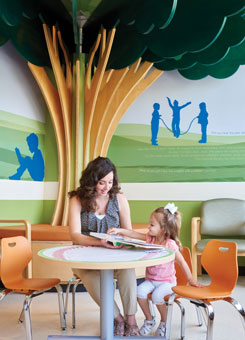Literacy: A Path to Lifelong Health
Ahmari, 3, squirms in her seat at the lunch table. With arms crossed and small tears in her eyes, she begs again, “I want my cookie!” But her mom, LaTia, stands firm and calmly repeats herself, “You have to eat your fruit before you can have your cookie.”
Like any good parent, LaTia just wants what’s best for her child—including a balanced diet and healthy boundaries. She’s been pleased to learn that Cincinnati Children’s wants the same for Ahmari—and for every child in our community. In fact, we want Cincinnati’s kids to be among the healthiest in the nation.
While many of our efforts are designed to get kids healthy and out of the hospital, we’re also working hard to promote health beyond the walls of the medical center. We’re partnering with local schools, businesses and other nonprofit organizations to give all children the best chance at achieving their full potential.
Promoting Literacy
 One of the greatest determinants of a child’s healthy development and overall well-being is literacy. Children who fall behind in reading are at an increased risk of low self-esteem, truancy, dropping out of school, juvenile delinquency and substance abuse.
One of the greatest determinants of a child’s healthy development and overall well-being is literacy. Children who fall behind in reading are at an increased risk of low self-esteem, truancy, dropping out of school, juvenile delinquency and substance abuse.
That’s why a key goal of Cincinnati Children’s strategic plan is to help children in Cincinnati Public Schools achieve third-grade reading proficiency. We know that when a child is doing well in school by third grade, they’re more likely to graduate from high school.
As a young mother raising Ahmari while working and going to school full time, LaTia understands the importance and benefits of academic success—and she’s working hard to set the example.
“Literacy is so important. I want Ahmari to start reading at an early age so that she doesn’t have trouble later on,” LaTia says. “I want her speech and literacy skills to be off the charts.”
Unfortunately, not every child receives the encouragement and resources they need at home to position them for academic success. In the United States, a third of young children, and half of children living in poverty, begin kindergarten without the skills necessary for lifelong learning. Doctors and researchers at Cincinnati Children’s are working hard to combat reading level disparities by giving young children a foundation for success.
Tom DeWitt, MD, director of General and Community Pediatrics and associate chair for education at Cincinnati Children’s, believes that learning to read successfully is as important to child health and development as immunizations.
“Helping parents and caregivers understand the importance of reading will have as big an impact on child health as anything else we do in pediatrics,” says Dr. DeWitt. “We’re looking beyond medical health to total well-being and recognizing that school success is crucial.”
A Foundation for Success, Built Together
More than 95 percent of a child’s brain is formed during the first six years of life. Reading exposure during this critical stage of development promotes early literacy skills, improves vocabulary, and increases curiosity and memory. It also helps prepare kids for school and places them on the path to healthier, more productive lives.
Together with Cincinnati Public Schools, the United Way, local child care centers, and other community partners, Cincinnati Children’s is developing and collaborating on many programs that promote literacy and improve kindergarten readiness.
On their first visit to our Pediatric Primary Care Center (PPCC), LaTia and Ahmari were introduced to two of those programs: Imagination Library and Reach Out and Read, led by Greg Szumlas, MD, and Tiana Henry. Reach Out and Read partners with healthcare providers to teach parents the importance of daily reading with their child. Imagination Library mails books directly to the family’s home each month—so by the time a child reaches her fifth birthday, she will have received nearly 60 books.
“As a mother, I just want what’s best for Ahmari, so if there are opportunities out there to help her, I’ll take advantage of them,” LaTia says. “They were able to sign me up for both programs at her initial doctor’s appointment.” LaTia’s already seen improvements in her daughter’s vocabulary—and her enjoyment when it comes to reading.
“Ahmari loves to read. She’ll pick out a book and go through the pages on her own, pointing out and naming all of the objects,” her mother beams. “Now I just need to buy a bookshelf because our collection has gotten so big,” she laughs.
Partnership Matters
Programs that respond to community needs and make a difference in children’s lives are made possible because of support from donors like Mary Lou Tecklenburg.
More than 20 years ago, when looking for a way to memorialize her mother, Mary Lou was inspired by Rosemary Schmidt, MD, a pediatrician at Cincinnati Children’s. Hearing Dr. Schmidt speak about the importance of childhood literacy, Mary Lou gave a gift to Reach Out and Read. Her initial gift has evolved into something beyond her hopes or imagination.
“I’ve been very impressed with the expansion of Cincinnati Children’s literacy efforts, the integration with other organizations and how important the programs are to the staff,” says Mary Lou.
Many donors, like Mary Lou, have become a part of our vision to be the leader in improving child health. Tackling literacy is an important initiative at Cincinnati Children’s—and we can’t do it alone.
“Nationally, there’s a movement to realize that literacy is just as important as medical health. And we are the leader in that,” says Dr. DeWitt. “Without Mary Lou’s support, it’s safe to say we wouldn’t be doing what we are today. She’s catalyzed and financed a very exciting chapter of literacy in this institution.”




